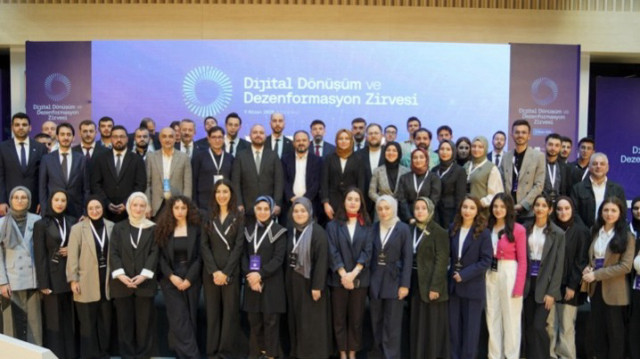
The Marmara Political Science Association concluded its EU-funded “Digital Transformation and Disinformation” project with a summit on April 5, 2025, aiming to empower youth with digital literacy and critical thinking skills to combat disinformation.
The Marmara Political Science Association has successfully concluded its “Digital Transformation and Disinformation” project with a high-profile summit held on April 5, 2025, at Marmara University’s Recep Tayyip Erdoğan Complex, Faculty of Political Science. Financed by the Turkish National Agency, the project aimed to equip young people with the knowledge and critical awareness needed to navigate the digital world and combat disinformation.
The Digital Transformation and Disinformation Summit opened with speeches from Enes Kır, President of the Marmara Political Science Association; Prof. Dr. Mustafa Kurt, Rector of Marmara University; and Davut Gül, Governor of Istanbul. The day continued with three panels, each exploring the digital age from different angles.
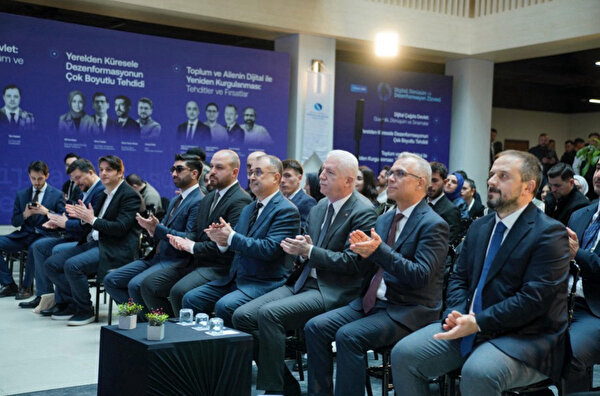
Moderated by Assoc. Prof. Öner Akgül, this session brought together Dr. Mehmet Çatlı, Tan Haskol, and Dr. Alper Işık to discuss the security dilemmas facing states in the digital transformation process.
Assoc. Prof. Akgül stated, “Today, it’s no longer about what is true, but what we want to believe. Everyone can see the flood; the real challenge is to build the ark.”
Dr. Çatlı emphasized that “states have been slow to adapt to digital transformation, and this delay demands a rethink of both security and legal systems.”
Dr. Işık warned that “sovereignty is drifting toward social media platforms,” while Tan Haskol argued, “In the age of data, the issue is not technical but structural,” highlighting the emotional dynamics of perception management.
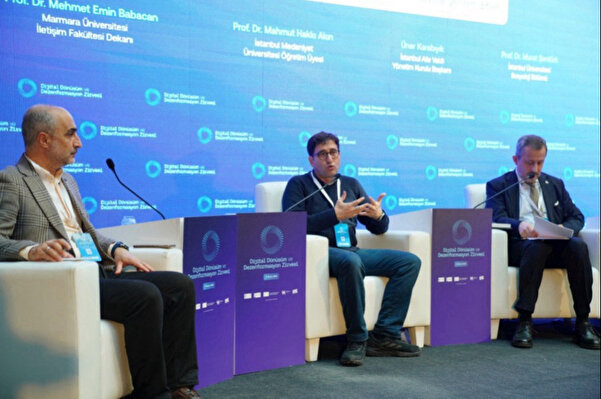
Moderated by Elif Kondakçı, Vice President of the Marmara Political Science Association, this panel featured Ömer Faruk Görçin (AA Verification Line), Cüneyt Polat (Editor-in-Chief, GDH), and Ömer Kablan (Coordinator of International Platforms, Yeni Şafak). The panel focused on the spread of disinformation and the importance of media literacy in the digital era.
Ömer Faruk Görçin stated, “The media can make you love the oppressor and hate the oppressed,” while Cüneyt Polat stressed, “Artificial intelligence and disinformation are shaping our world,” pointing to the impact of fictional content.
Ömer Kablan underlined the pressure of speed on accuracy, stating, “Journalism has become faster, but at the cost of truth. Artificial intelligence adds an extra layer of complexity to verification processes.”
Moderator Elif Kondakçı concluded, “Disinformation cannot be entirely prevented—but we must learn to approach information with a healthy dose of doubt.”
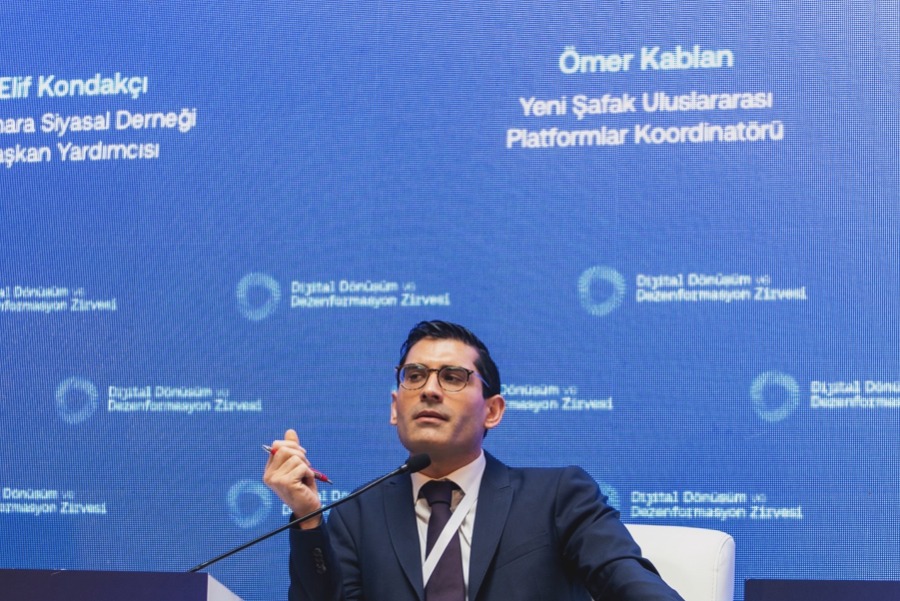
Led by Prof. Dr. Mehmet Emin Babacan, Dean of the Faculty of Communication at Marmara University, this session explored how digitalization is reshaping social structures and the family.
Prof. Babacan noted, “The family is the oldest institution in human history,” emphasizing its ongoing relevance in a shifting society.
Prof. Dr. Mahmut Hakkı Akın explained, “The family is the foundation of societal order,” while Üner Karabıyık of the Family Foundation added, “Our institution of family is still strong, but digital dependency is raising anxiety levels.”
Prof. Dr. Murat Şentürk of the Green Crescent warned, “New media is creating deep fractures in family dynamics,” especially in intergenerational communication.
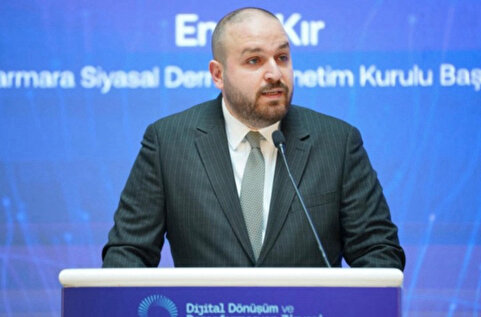
The summit marked the conclusion of an intensive educational series held between October 11–20, 2024. Throughout the program, participants received expert training on digital security, disinformation, artificial intelligence, media literacy, and data analytics. Key sessions included:
Ontological Security in New Media – Dr. Aslı Nur Düzgün
Cybersecurity in Digital Transformation – Dr. Alper Özbilen
Legal Aspects of Disinformation and Data Protection – Dr. Melih Can Korkmaz
Reshaping Society Through Digitalization – Prof. Dr. Mehmet Emin Babacan
Data Analytics and Digital Transformation – Melek Öztürk (Turkcell)
AI, Cyber Threats, and Disinformation – Dr. Zümrüt Müftüoğlu & Dr. Yasin İnağ (Presidency’s Digital Transformation Office)
Methods for Combating Disinformation – Mert Ödeş (Presidency’s Directorate of Communications)
Digital Transformation’s Impact on Family Bonds – Psychologist Mehmet Büyükçorak
Disinformation in Media Coverage of Palestine – Prof. Dr. Yusuf Özkır
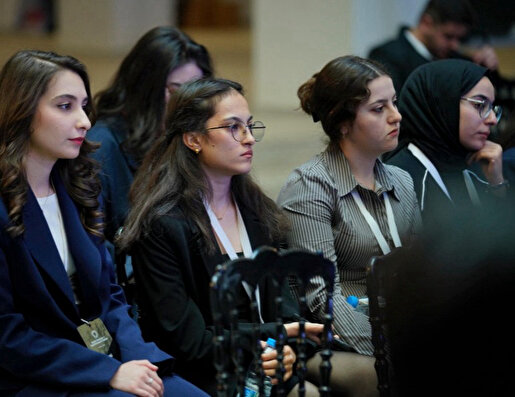
Founded in 2019 as a youth-led initiative, the Marmara Political Science Association connects graduates and affiliates of the Faculty of Political Science at Marmara University. The association fosters collaboration among members while empowering young people to lead in academia, public service, the arts, and society by drawing on their cultural heritage.
The “Digital Transformation and Disinformation” project was designed to help young people understand digital transformation processes, grow into conscious individuals, and develop a critical approach to disinformation. Through collaboration with public institutions and private sector partners, the project provided interactive training to build skills in media literacy, digital tools, and content verification.
With this initiative, the Marmara Political Science Association fulfilled its mission of preparing youth to harness the potential of the digital world—while staying alert to its risks. The summit brought together experts from academia, media, and civil society, creating lasting awareness around the demands of the digital age.
Hello, the comments you share on our site are a valuable resource for other users. Please respect other users and different opinions. Do not use rude, offensive, derogatory, or discriminatory language.
The floor is all yours.








